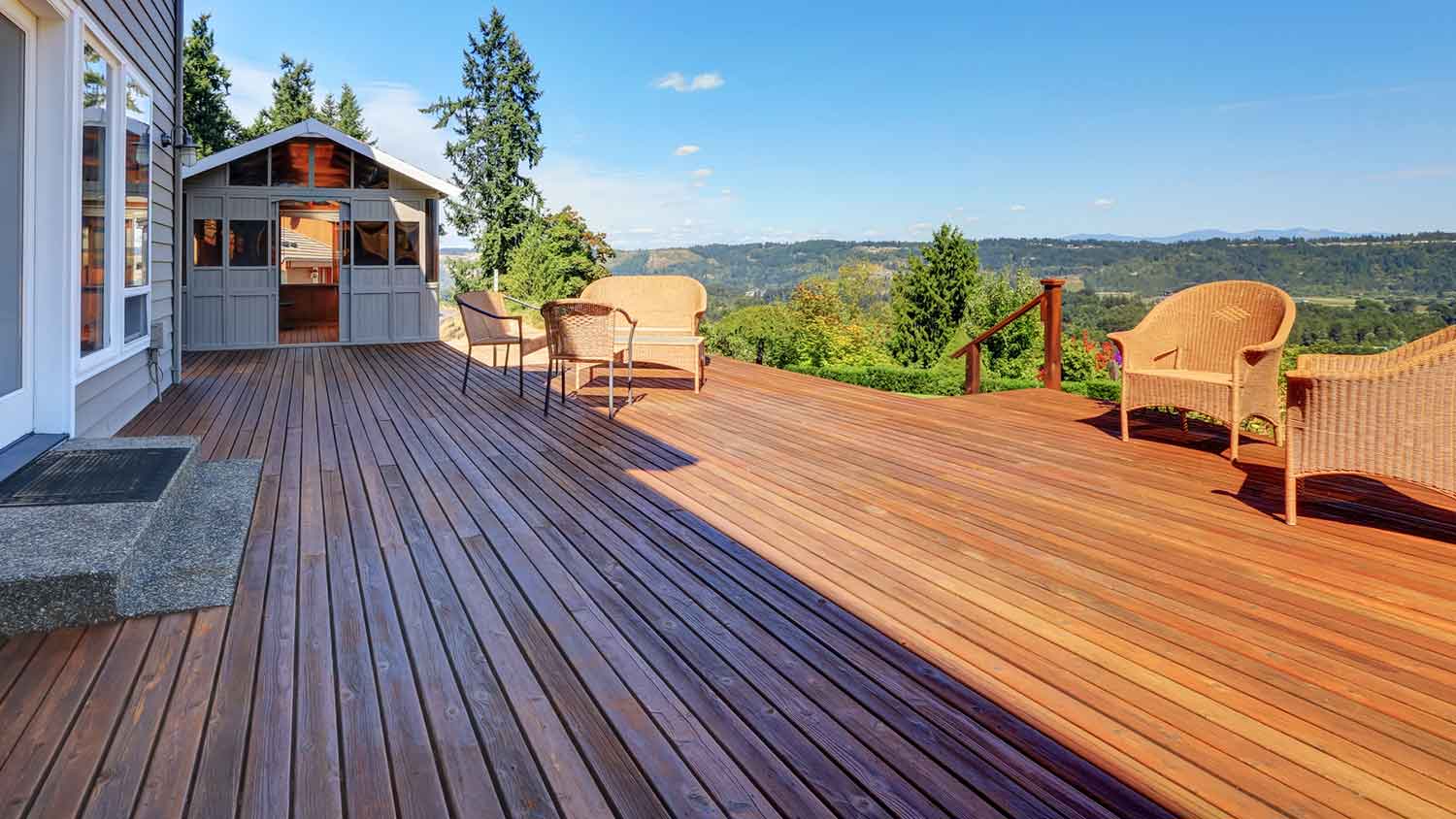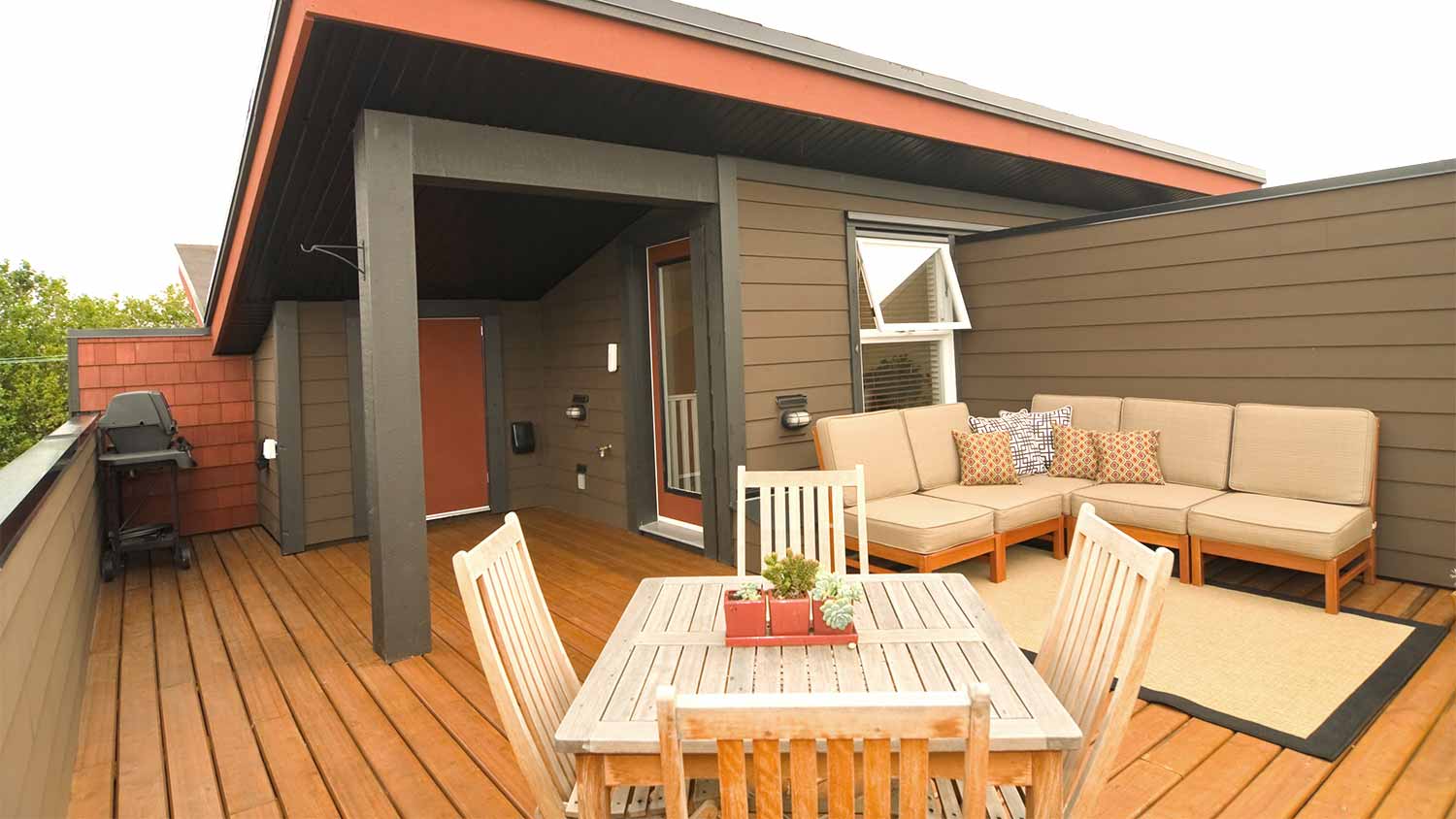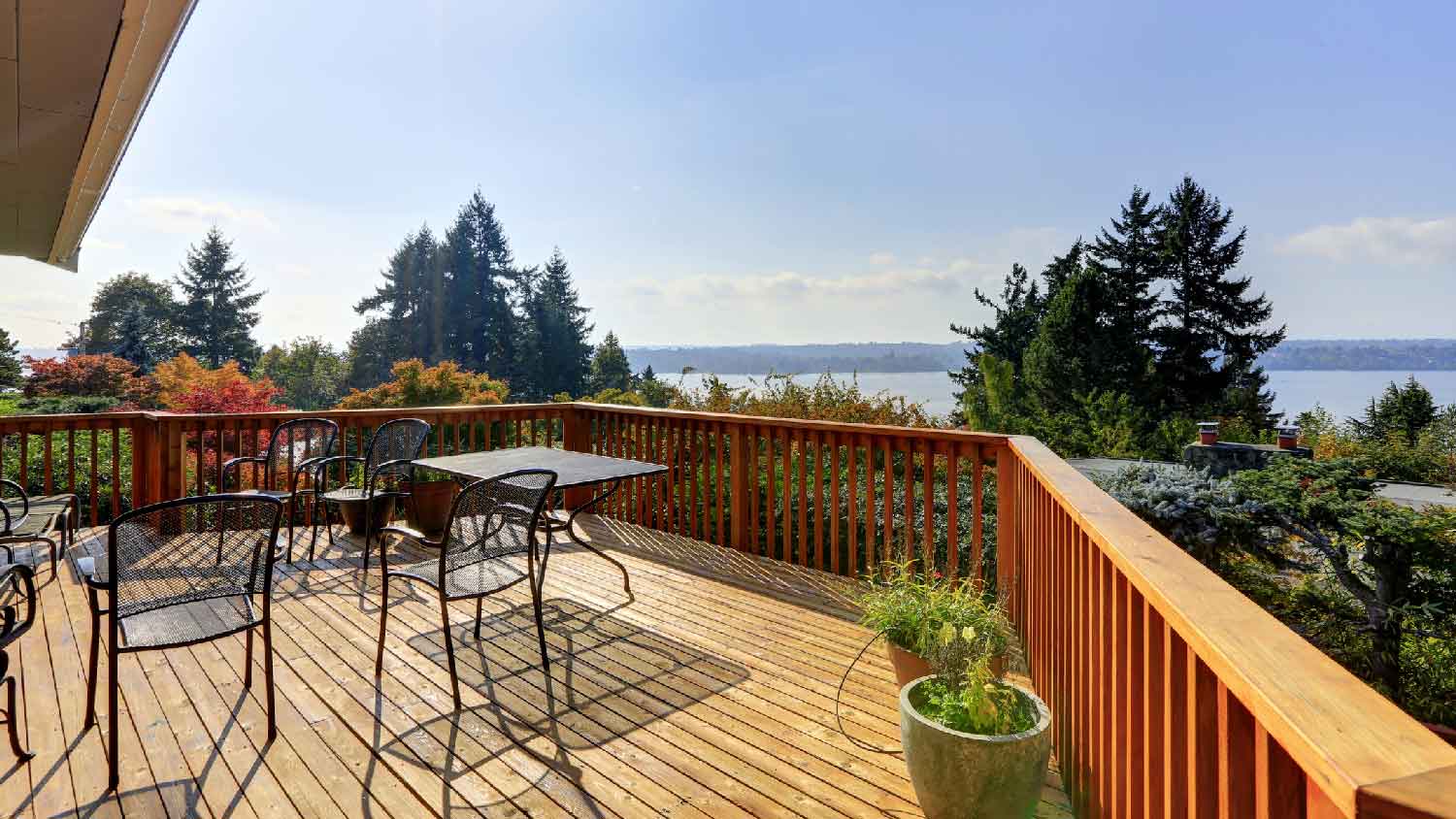
Ipe decking costs vary based on size, construction, finish, and whether you hire a professional. Learn more about how to budget for this project.
Deck and porch service costs depend on your project and location. Check with a local pro for your specific job.
The average cost of deck repairs is around $2,000, but this can vary widely depending on the scope of the damage and materials used.
Materials for deck repairs can range from $3 to $45 per square foot, with the price depending on the type of deck and its material.
Labor costs for deck repairs typically range from $50 to $100 per hour, with most repairs taking between two to five hours to complete.
Minor repairs, such as fixing popped nails, can cost as little as $0.30 per square foot, making them an affordable fix for smaller issues.
Replacing or resurfacing a deck costs between $15 to $50 per square foot, providing a more extensive upgrade than simple repairs.
For an average cost of $2,226, you can get deck repairs done, like fixing boards, loose steps, and wobbly railings, to get it looking great and operating safely. Depending on your deck type, expect to pay $3 to $45 per square foot in materials for the repair. Deck replacement costs $8,000 due to additional materials and extensive labor.
Hanging out on your deck is a nice way to unwind from a busy day, but structural issues can make your space unsafe or uncomfortable. Here’s how to budget for deck repairs so you can get back to enjoying your yard.
The size of the repair area plays a major role in the cost of deck repair or total deck replacement. To get an idea of repair costs, you can inspect your deck and measure the problem areas. The materials for deck repairs cost between $3 and $45 per square foot, with the type of deck also influencing the cost. Larger areas will also carry higher material costs and greater labor costs.
| Deck Size | Repair Cost Range |
|---|---|
| 10-by-10 | $300–$4,500 |
| 12-by-12 | $432–$6,480 |
| 12-by-14 | $504–$7,560 |
| 14-by-14 | $588–$8,820 |
| 14-by-16 | $672–$10,080 |
| 14-by-20 | $840–$12,600 |
| 16-by-16 | $768–$11,520 |
| 16-by-18 | $864–$12,960 |
| 20-by-20 | $1,200–$18,000 |
Size also impacts the cost of rebuilding a deck or starting one from scratch. The average cost to build a new deck ranges between $4,500 and $18,000. The larger the deck, the more the build costs—at around $30 to $60 per square foot.
Hiring a reputable, professional deck contractor will help you get the project done right the first time. State laws may require your contractor to hold a current builder’s license to work on decks. Check your local laws and ask for licensing information before hiring someone.
Labor costs between $50 and $100 per hour, with most projects taking two to five hours. Set aside at least $100 to $500 for labor. Expect costs and project times to increase if you’re replacing a deck.
Your deck contractor will handle all aspects of your deck project, from assessing the necessary repairs and removing old deck parts to installing the replacement parts.

The cost of replacing broken boards depends on the deck materials and the best wood for your deck. Different deck board materials also have varying life spans, so you may need to replace certain types more often than others.
| Decking Material | Average Cost (Per Square Foot) | Benefit |
|---|---|---|
| Cedar | $3–$7 | Rich color and cedar smell |
| Pressure treated lumber | $8–$20 | Easy to install and maintain |
| Ipe Hardwood | $10–$20 | Lifespan of 30 to 50 years, resistant to rotting |
| Redwood | $5–$30 | Unique grain patterns |
| Composite wood | $12–$45 | Low initial cost and weather-resistant |
| Recycled plastic lumber | $30–$45 | Resistant to weather and decay, doesn’t splinter or warp |
If your deck just needs a repair or two, the cost depends on the issue. Minor cosmetic fixes will cost much less than major structural repairs.
Here are some common decking issues that you may encounter when evaluating your deck for repairs:
| Decking Issue | Average Cost to Repair |
|---|---|
| Railing Repairs | $500–$4,000 |
| Popped Nails or Screws | $0.30 per square foot |
| Loose Stairs | $25–$50 per stair |
| Mold and Rot | $200–$500 |
| Mildew | $50–$110 |
| Board Replacement | $500–$4,000 |
| Termite or Other Pests | $200–$600 |
| Resurfacing | $15–$50 per square foot |
| Refurbishing | $100–$2,000+ |
| Stair anchoring | $15–$40 per step |
| Pressure washing | $200–$450 |
Depending on the extent of the damage, railing repairs can cost about $500 to $4,000 or more. Again, the type of material will make a big difference, with cable and composite railings costing the most.
Popped nails or screws cost an average of $0.30 per square foot to repair. While this might seem like a minor issue, a simple screw can make a big difference in the overall stability and safety of the area, especially on stairs. Luckily, this is one of the easiest DIYs if you’re a handy homeowner.
Deck stairs cost an average of $25 to $50 per stair to fix. Loose, wobbly stairs create a major tripping hazard, which is important to address ASAP. Be sure to check for loose or missing nails and screws before attempting any major work, as these are often the source of the problem. However, if there seems to be an issue with the overall structural integrity of the stairs, more serious repairs may be necessary.
If mold is the primary issue affecting your deck and the damaged area isn’t weight-bearing, you can trim away damaged wood on your own and fill in the area with an epoxy compound. These compounds cost $35 to $70 per quart or $100 to $200 per gallon. A pro charges about $200 to $500 for this repair.
Mildew, on the other hand, can be power washed. If you don’t own a power washer, you can rent one for $40 to $75 per day and purchase cleaning supplies for $10 to $30. However, know that incorrect power washing can lead to further damage to your deck’s structure and appearance, so you’ll want to have a good handle on your approach and technique for this project.
Professional termite and pest control on a deck costs an average of $200 to $600. Staining and sealing your deck every two to three years can dramatically decrease the likelihood of infestations.
Resurfacing a deck costs around $15 to $50 per square foot. This project totally transforms the look of a deck by replacing decking boards, stairs, and railings while keeping the underlying base structure intact.
Refurbishing a deck averages $100 to $2,000 or more, depending on the materials and the extent of the work. Refurbishing involves minor cosmetic fixes, such as sanding, restaining, and replacing rusted nails to refresh the deck's appearance.
Anchoring steps costs between $15 and $40 per step. This repair helps correct wobbly steps and is an important fix for the deck's overall safety.
Pressure washing costs around $200 to $450 on average, while the cost to stain a deck is between $550 and $1,250. If you’re up for the money-saving DIY deck staining option, you’ll pay between $20 and $250 for the stain and $35 to $175 per day to rent a pressure washer.
Your location can have a major impact on labor and material costs. Densely populated urban areas and places with higher costs of living will have the highest costs.
| City | Repair Cost Range |
|---|---|
| Chicago, Illinois | $1,500–$5,500 |
| Saint Louis, Missouri | $1,200–$4,800 |
| Saint Paul, Minnesota | $1,400–$5,200 |
| Houston, Texas | $1,300–$5,000 |
| Atlanta, Georgia | $1,200–$4,700 |
| Birmingham, AL | $1,100–$4,500 |
| San Jose, CA | $1,700–$6,000 |
| Fort Lauderdale, FL | $1,400–$5,300 |
There’s a lot more to a deck than just the platform. Here are other additional costs to keep in mind when getting bids for your deck repair.
Replacing your deck railing can cost anywhere between $35 and $210 per linear foot. Railings are essential safety features for raised decks, and they’re also nice to have on ground-level or floating decks to prevent tripping hazards. Your final cost depends on the type of material you choose for the railing. Below are the average costs you’ll pay for these common building materials:
| Deck Railing Material | Average Cost (Per Linear Foot) |
|---|---|
| Wood | $40–$60 |
| Metal | $55–$85 |
| Composite | $80–$165 |
| Glass | $140–$210 |
| Cable | $115–$175 |
While you won’t likely need a permit for a minor repair, you may need to invest an extra $225 to $500 to cover permit fees for a new build. Deck size and elevation often affect the cost. Not all states require permits, but many of them do, so be sure to double-check or consult your contractor before starting the project.
If you’re seeking professional deck repairs during the busiest times of the year—from late spring through early fall—expect to pay a premium cost due to the extra demand. Putting off cosmetic repairs can save you a lot in this area, but if you’re in need of a structural repair that impacts your deck’s safety, it’s best to get it done right away.
If you’re having a significant repair done, such as resurfacing, restaining, or refurbishing, there may be extra costs for the prep work involved. This covers tasks like power washing, staining, sanding, and paint stripping.
Demolishing an old deck costs about between $5 and $15 per square foot. This includes removing the old materials and the demolition itself. However, disposing of the materials yourself can help cut costs.
If you need a major repair or rebuild, your contractor may need to perform a site evaluation before taking on the project. Many contractors waive this fee if you choose to hire them for the job, and others may offer a free quote. Always ask your pro during the initial phone call to avoid surprise fees.
The average cost to stain a deck professionally is between $550 and $1,250. Whether hiring out or DIYing, always follow up with a clear sealant for added protection. Be sure to stain and reseal your deck every two to three years.
Going against the grain of a standard deck build will result in higher labor and material costs. Before you commit, be sure to check out portfolios and credentials for multiple contractors and request custom quotes to determine who offers the best bang for your buck.
If a significant amount of materials need to be hauled away, disposal may be more expensive. Again, you might save money in this area if you’re willing to haul and dispose of the materials yourself.
Homeowners insurance may not cover all issues related to your deck, such as wear and tear or specific types of damage. You might want to consider purchasing a deck insurance policy, usually offered by the builder, to make sure repairs are covered and your investment is protected.
Building a deck is a worthwhile home improvement project that's highly likely to offer you an impressive return on investment. Remodeling by JLC's 2023 Cost Value Report found that wooden decks offer a 52.4% ROI on average, and composite decks offer a 39.8% ROI nationally.
While it’s a great idea to repair rather than replace a deck when possible, there are some instances when it’s better to start fresh. Unfortunately, if your deck is in poor shape, your best option may be to tear it down and rebuild. Here are some key signs that it’s time to budget for deck replacement costs.
| When to Repair Your Deck | When to Replace Your Deck |
|---|---|
| Minor damage, like small cracks | Significant damage, like large holes and split boards |
| Mold on the exterior that hasn’t permeated the interior | Extensive termite or mold damage |
| Popped nails or screws | Massive amounts of rotting wood |
| A build-up of dirt and grime | The overall structure sways |
| Loose railing | Frequent and high repair costs |
| It’s in need of a maintenance visit | It’s older than the projected lifespan |
Hiring a local deck repair pro may cost more upfront, but it delivers safer results, longer-lasting repairs, and peace of mind. Professionals know how to identify structural issues, use the right materials, and restore your deck so it’s safe, durable, and visually appealing—often saving you money on future repairs.
Deck repair is a complex project that requires construction knowledge and hands-on experience. Here are some of the top reasons to work with a pro:
Deck repair pros can identify hidden structural problems, such as rot, loose fasteners, or compromised joists, before they become safety hazards.
They have the proper tools and materials to repair or replace boards, railings, stairs, and supports correctly.
Working with a pro ensures your deck meets local building codes and safety standards.
Professionals deliver durable repairs that extend the life of your deck and improve its appearance.
Bundling deck repair with related services, such as staining, sealing, or refinishing, can reduce overall maintenance costs.
If you want to handle some parts of the project yourself, these tasks can help reduce labor time and costs:
Clear the deck of furniture, planters, grills, and décor before repairs begin.
Trim back nearby plants or shrubs to give the repair pro easy access to the deck structure.
Inspect and note any visibly damaged boards, railings, or stairs to discuss with your contractor.
Plan future upgrades—such as staining or railing replacements—in advance so repairs align with your long-term goals.
To offset the cost of professional labor, you can minimize your overall deck repair costs by buying the decking materials yourself and even completing some repairs. Here are some approaches for saving on repair costs:
Ask your contractor for a complete list of needed materials, then purchase them yourself from your local hardware store.
DIY certain minor repairs, such as fixing popped nails, cleaning and sealing, and filling in cracks with composite.
Consider hiring a handyperson instead of a carpenter or deck company for minor repairs.
After repairs are made, dispose of leftover materials yourself.
Resurface your deck every two to three years or as needed to keep it looking fresh and lengthen its life span.
Be ready to discuss with a pro the type of decking material you have (wood, composite, or PVC), as this can affect the repair methods and tools required.
If your budget allows, ask your pro about add-ons like board replacement, railing repair, staining, or sealing to extend the life of your deck.
Be prepared for unexpected costs, such as hidden structural damage, rot, or hardware replacement, that may be discovered during the repair process.
Talk with your pro about local building codes or permit requirements, as these may impact the scope, timeline, and cost of your deck repair.
Home is the most important place on earth, which is why Angi has helped more than 150 million homeowners transform their houses into homes they adore. To help homeowners with their next project, Angi provides readers with the most accurate cost data and upholds strict editorial standards. We’ve surveyed over 10,000 real Angi customers about their project costs to develop the pricing data you see, so you can make the best decisions for you and your home. We pair this data with research from reputable sources, including the U.S. Bureau of Labor Statistics, academic journals, market studies, and interviews with industry experts—all to ensure our prices reflect real-world projects.
Want to help us improve our cost data? Send us a recent project quote to [email protected]. Quotes and personal information will not be shared publicly.
From average costs to expert advice, get all the answers you need to get your job done.

Ipe decking costs vary based on size, construction, finish, and whether you hire a professional. Learn more about how to budget for this project.

Old and run-down porch railings can be an eyesore and pose a risk of falling. Find out how much it costs to replace your worn out porch railings with new materials.

Discover redwood deck costs, including average prices, installation factors, labor rates, and tips to save on your new deck project.

Nothing ruins outdoor ambiance like a greenish deck. Discover why your deck turns green and find some straightforward solutions to fix and prevent the issue.

Discover rooftop deck costs, key price factors, and ways to save. Learn what impacts rooftop deck installation costs and how to budget for your project.

Learn how to replace a deck railing with this step-by-step guide, including required tools, material costs, safety tips, and when to hire a professional.